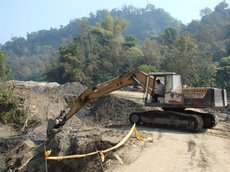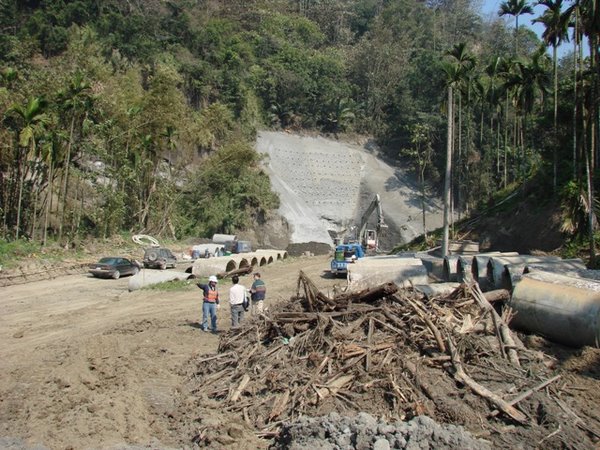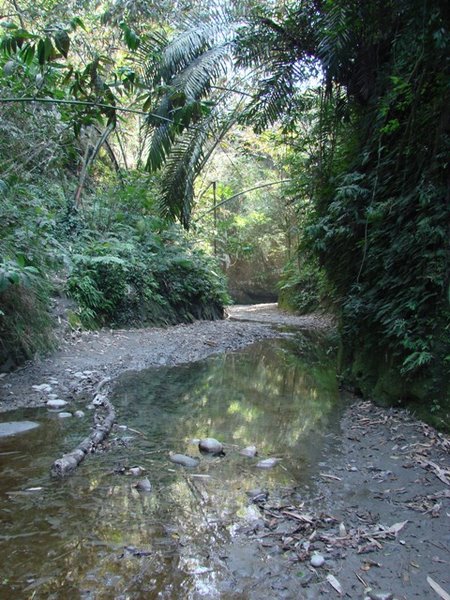
While we are somewhat getting away from the subject of the Hushan Dam issue here. We hope that our readers can appreciate the concern we have at this point at the current attitude of the state towards protest. We are, after all, a blog protesting against the construction of the Hushan Dam and the destruction of the Huben-Hushan Important Bird Area (IBA).
Suppress democracy and freedom of expression and get a promotion. Well, Beitou Precinct Chief Lee Han-ching, the chief at the notorious Sunrise Records store incident on November 4th during the protests against Association for Relations Across the Taiwan Strait Chairman Chen Yunlin has been promoted.
First, Agency Director-General Wang Cho-chun told reporters on November 18 that Lee's handling of the Sunrise Records store incident was appropriate, then, later, he reprimands him. Now they've promoted Lee.
Democratic Progressive Party (DPP) Taipei City Councilors have released 53 photos of police allegedly using force against protesters during demonstrations earlier this month. The Paris-based International Federation for Human Rights has expressed concern over what it calls "grave violations of human rights" committed by police during the protests. As environmentalists we are frequently involved in protest. Recent events have sparked fear as the government continues to suppress freedom of speech and other civil liberties. The time may well be coming when the Taiwan environmental movement once again has to operate underground as it did during Taiwan's White Terror period.
See: What's in store for environmentalists in Taiwan's new Police State ?
We chatted to an expat law enforcement veteran and criminal sciences graduate who has witnessed violent protest on several occasions abroad. Under the present circumstances it is best if this person remains anonymous. Here are some comments from this person:
During the early November demonstrations in Taipei the protesters were pretty well behaved as far as protests go. Yes, there was some throwing of plastic bottles and similar objects, shouting, scuffles, occasional overturning or flattening of police barricades and such like. But there was not rampant mob violence by armed protesters, petrol bombings, Molotov cocktails, rampant destruction of property, looting, and the over-turning of cars that is all too common in protests seen around the globe today.
One just had to look at the clothing and equipment worn by many police officers to gauge what the real threat of the protesters to the police was. While some police officers were dressed in full riot gear of parts thereof, many, many police officers were dressed in their everyday standard issue police uniform and confronted protesters with nothing more than a big bamboo stick or baton. If the protesters really were a danger to the police I doubt these officers would have been dressed in this manner.
The general tactics of the police in confronting protesters was poor. The police presence was a huge show of power and obviously meant to intimidate. Often, TV footage showed motley groups of police officers dressed in standard everyday uniform to riot gear loosely engaging protesters. A very dangerous move if confronting a dangerous mob. If the crowd was a real angry and dangerous mob many of these groups of police officers would have been isolated and surrounded by the mob in no time and been seriously injured or killed. Officers would have had to fire their weapons to escape the mob. Such tactics doesn't say much for the competence of those in charge.
With Taiwan's authoritarian past and almost four decades of martial law, the police force in Taiwan was largely used to enforce the will of the state. They were the upholders of iron discipline rather than officers of the peace. As most of Taiwan's senior officers served much of their career's as the enforcers of a one party state it begs the question, "Do these men actually understand and believe in the real role of the police as agents of peace and lawfullness within the community?" The same question could be put to the men and women in the ranks. Do they really understand the role of the police?
Take a walk or ride around most Taiwan towns or villages and you will see police officers. Look at the vendors spilling out into the road. Look for obvious dangerous situations where construction, parked motor vehicles, and other hazards pose a serious risk to members of the community. What have the police, the officers of the peace and guardians of society, done about the situation? In most instances they just ride on by day in and day out.
The police force in Taiwan is well equipped. Taiwan also doesn't have a major crime problem. If we consider the high number of university graduates in the force it must be one of the most academically educated forces on the planet. Yet, looking at the villages and towns these officers "protect" we see huge safety problems. This shows that from the top down there seems to be little understanding of what they should be doing as officers of the peace.
Also see: Chinese or nothing ! The Fairy Pitta Protected Area letter response
Thursday, November 27, 2008
Suppress democracy and freedom of expression and get a promotion: Police Chief gets promoted
Posted by
Wild at Heart Legal Defense Association
at
1:17 PM
![]()
Subscribe to:
Post Comments (Atom)








No comments:
Post a Comment